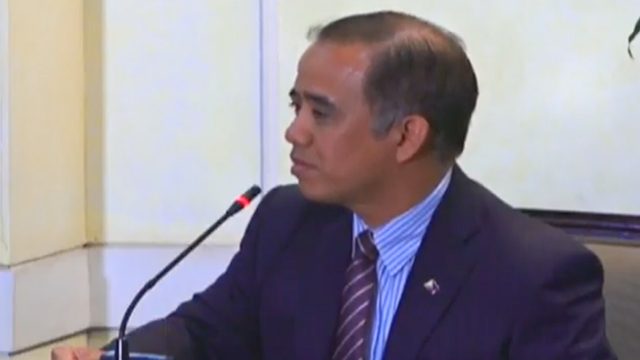SUMMARY
This is AI generated summarization, which may have errors. For context, always refer to the full article.

MANILA, Philippines – Deputy Ombudsman for Luzon Gerard Mosquera, one of the candidates gunning for an associate justice position in the Supreme Court (SC), said he would’ve dissented with the ruling on the Enhanced Defense Cooperation Agreement (EDCA) if he were a member of the High Court when the case was decided.
In his interview with members of the Judicial and Bar Council on Tuesday, July 4, Mosquera was quizzed by retired SC justice Angelina Sandoval-Gutierrez about his knowledge of the 2016 EDCA ruling.
The SC in January 2016 declared constitutional the military deal signed by the Philippines and the United States in 2014 under the Aquino administration.
“The ruling of [Chief Justice Maria Lourdes] Sereno is that EDCA merely implements the Mutual Defense Treaty of 1951 and Visiting Forces Agreement of 1988. So that was the ruling. But if you’re a member of the Supreme Court, would you have concurred or dissented?” Gutierrez asked Mosquera.
“I would have dissented, your honor,” he answered.
“On what grounds?” Gutierrez then asked.
“On the ground that the EDCA would authorize something that can only be done under a separate treaty,” Mosquera said.
The retired SC justice again emphasized the ruling that EDCA is a “merely implementing bilateral agreement.” But Mosquera insisted that the country’s Mutual Defense Treaty “does not authorize actual combat cooperation as well as stationing of foreign troops in the country.”
“My personal opinion is that an EDCA would not be sufficient, such that a treaty would have to be executed to justify stationing of foreign troops in the country,” he added.
Gutierrez then asked Mosquera about the difference between a treaty and a bilateral agreement, and how both are terminated.
“A treaty is terminated by mutual consent of the parties and ratified by the appropriate legislative authorities [upon agreement] of signing [countries],” the candidate answered, with the help of Gutierrez.
But Gutierrez told Mosquera to “better research on the topic” when the latter said a bilateral agreement “can be terminated unilaterally by one of the countries.”
“No. You better research on that topic. Your answer is not correct,” she added.
The two also discussed whether there should be a right-to-die law or assisted suicide in the Philippines.
“Is [a right-to-die law] a violation of the constitutional provision that no person shall be deprived of the life, liberty, or property without due process of law?” Gutierrez asked.
Mosquera answered, “I personally believe that the Philippines should not have a law providing for legalized or assisted suicide, but not on the right to life, the protection against deprivation of life, liberty, without due process of law, but on principles of the Constitution protecting life in general.”
During his 40-minute interview, Mosquera answered questions on his decision to apply for a vacancy at the SC, and whether he is more competent for a position at the Sandiganbayan instead of the High Court.
“I personally believe that there is still room in the SC for somebody with my educational background, my experience for the past 16 years. I believe that the SC will benefit from diversity – members from diverse backgrounds, diverse experience, diverse work.”
Mosquera was appointed deputy ombudsman in 2012, replacing Francis Jardeleza who had been appointed solicitor general.
Prior to that, he served as commissioner and legal department head of the Presidential Commission on Good Government from 2010 to 2012, and a United Nations Adviser for Anti-Corruption from 2004 to 2010. – Rappler.com
Add a comment
How does this make you feel?
There are no comments yet. Add your comment to start the conversation.